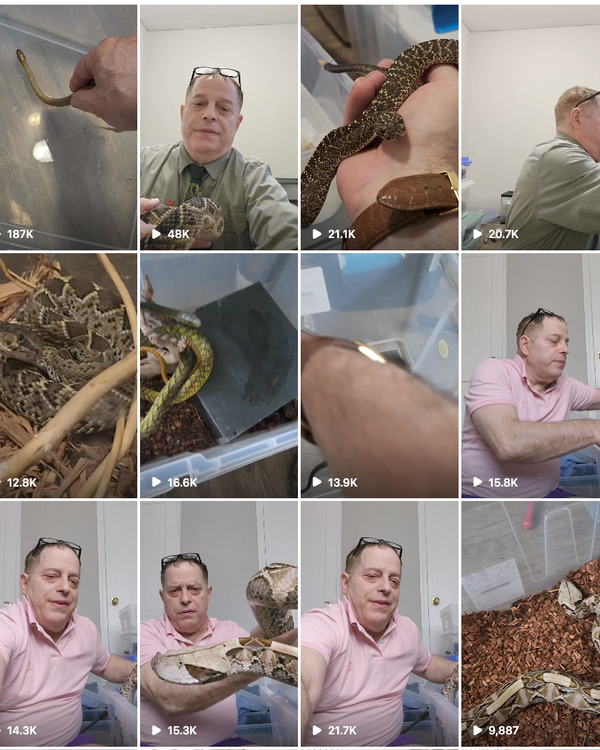

On Facebook, there is a page with some 49,000 subscribers called Venomous Snakes Classifieds. Despite the background photo of a woman in a bikini eating a slice of watermelon, the conversation largely sticks to the topic at hand, thanks to the tireless posting of its administrator, a South Carolina snake collector named Jeff Leibowitz.
On the evening of September 5, Leibowitz posted a video with one of his prize species — an inland taipan from the desert of Australia, widely considered to be one of the most venomous snakes in the world. “There’s no need to be so scared of them if you just know their limitations,” he said, holding the snake between his thumb and forefinger. This is called “free-handling” — the controversial practice of holding and manipulating the reptiles with your bare hands without tongs for protection. Leibowitz explained that the snake could not bite him because he was holding it high enough on its body that it could not turn around and bite him. “See how he’s trying to get me,” he said.
Lots of snake folks consider Leibowitz to be an unnecessary risk-taker for his views about handling deadly venomous snakes, about which he is frank: “Antivenom is for pussies,” is how he put it recently.
Later that night, Leibowitz posted again to Venomous Snakes Classifieds. “Who has a meeting access to anti-venom for an inland taipen,” he wrote, somewhat unintelligibly, just after 11 p.m. He followed up just after 2 a.m. urging “anyone who has anti-venom for an inland taipan or knows someone who does” to call the local hospital that he had been rushed to after calling 911.
Leibowitz’s family confirmed to local news that he had been bitten and that he was given the proper antivenom. He spent most of this week in the hospital in critical condition, according to local police. (A family member who provided updates on Leibowitz’s health status on social media did not respond to a request for comment.) Experts say that he could be facing long-term organ and nerve damage from his snake bite; the inland taipan is a relatively chill snake, but it is also one of the snakes that gives Australia its reputation for snake horror.
The bite incident has reignited a long-standing controversy in the snake world over how we keep, treat, and protect poisonous snakes. The ensuing and snowballing attention has also upset snake owners, who often feel scrutinized and can easily run the risk of losing their animals.
Many snake enthusiasts think free-handling is nuts. “There are people that are like, ‘It’s my snake, it’s my life, I’ll do whatever I want,’” said Michael Starkey, the founder of the conservation group Save the Snakes. “I think of free-handling as very comparable to base jumping — it’s a very risk-intense hobby. It is incredibly risky, and I’m sure that’s a part of the attraction to it.”
To state the obvious, Starkey advises against free-handling. “In professional circles, there’s no reason to ever handle a venomous snake with your bare hands,” he said. “That’s how we get situations like this.”
Andy Gabbard, the social-media manager at New England Reptile Distributors, says we’re seeing an increase in spicy snake videos, including videos of free-handling venomous snakes. You can guess why. “A lot of it is also for clicks and likes on social media, which has just become so big,” Gabbard said. “It’s the thrill, and then a lot of it is the viewership that it can lead to,” he said.
Stories like this don’t help the reputation of snake guys. Over the years, a trickle of stories about the legal exotic-animal trade in the United States has built an image of seediness around some of its more far-out purveyors. Tiger King obviously didn’t help. Nor do snake-farm murders. Or snakes asphyxiating owners. Or armed standoffs at snake farms. Or allegations on the always feisty sub-Reddit r/Snakes of notable breeders overbreeding to get “rarer morphs” (a.k.a. colorations), then culling the rest of the animals. While these incidents are outliers — most snake owners lead quiet, safe lives with their ectothermic pets — they can also impact the access to these misunderstood animals.
“Within the venomous community, this is a shock,” said Starkey. “But it creates news, too. We’ve seen what happens when there’s cases like this where we have sort of a really, I don’t know, newsworthy or kind of a crazy situation happen; it can result in legislation where people that work or keep snakes may lose those rights as a result, because of fear. And overall, it can even increase people’s fear of snakes.”
The Venomous Snakes Classifieds Facebook group is now mostly just people asking for updates on Jeff Leibowitz’s health and not receiving any — although some members said he’d gone live on his YouTube channel on Tuesday or Wednesday.
Unfortunately, the animals always catch the consequences. Local police confirmed that two cats and 14 snakes were seized from Leibowitz’s home in Florence, South Carolina. That haul included one death adder, two black forest cobras, one green mamba, and the inland taipan at question. Due to concerns over potential disease because of what police called “substandard” conditions at the home, the snakes were unable to be relocated to a regional zoo or reptile farm. State officials confirmed that all 14 were euthanized on Monday night.




